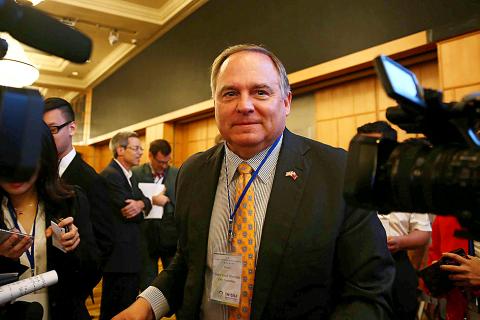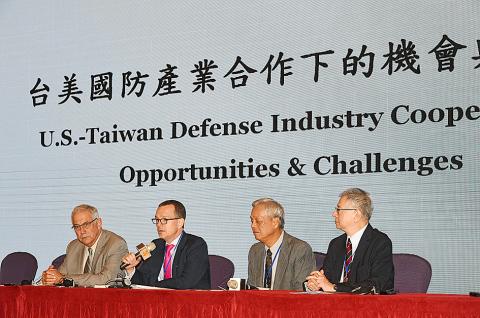The inaugural Taiwan-US Defense Business Forum was held yesterday in Kaohsiung to facilitate bilateral defense industry cooperation and ease Taiwan’s entry into the global defense supply chain.
The event at the Grand Hi-Lai Hotel was jointly organized by the Taiwan Defense Industry Development Association and the US-Taiwan Business Council.
The one-day event was part of the annual US-Taiwan Defense Industry Conference, a platform for dialogue on Taiwan’s national security needs, weapons procurement and defense cooperation that had been held every year in the US since 2002.

Photo: CNA
One attendee, retired lieutenant general Francis Wiercinski, a former US Army Pacific commander who is now senior vice president and managing director of US-based Cubic Corp, told reporters he was happy to participate in the event and conduct exchanges with partners in the region.
“We are all working with industry and trying to do better on both sides learning from each other,” Wiercinski said.
The forum’s focus on the shipbuilding, cybersecurity and aerospace industries reflects their importance to national security and their positive effect on the broader economy, Chinese Council of Advanced Policy Studies secretary-general Andrew Yang (楊念祖) said.

Photo: Chang Chung-yi, Taipei Times
The environment for bilateral defense industry cooperation is generally positive due to the policy of US President Donald Trump’s administration and long-term US strategic interests and values, panelists said.
Council president Rupert Hammond-Chambers said he has high hopes for Trump’s commitment to assisting Taiwan’s defense capabilities, adding that Trump has “good people” in his administration.
Taiwanese businesses are already part of the global supply chain, which bodes well for the efforts of the nation’s defense industry for such participation, he said.
“I see no reason Taiwan should not succeed here,” he added.
BAE Systems industrial strategy vice president Philip Georgariou said Taiwan has a “few challenges and many more opportunities.”
However, the level of protection for intellectual property and trade secrets in Taiwan is an abiding concern for potential defense industry partners, he said.
Taiwanese corporations that have dealings with or subsidiaries in China need to properly firewall their organizations, because due diligence requires US industrial entities to have assurances that their sensitive technologies and secrets are safe, he added.
Commitments to protect intellectual property and information security are “essential to trust,” Hammond-Chambers said.
“If I can take down one barrier, one issue, it is IP [intellectual property] and trade secrets,” he said.
Another point of concern is Taiwan’s defense spending, which as a share of GDP has remained low, Hammond-Chambers said, calling President Tsai Ing-wen’s (蔡英文) increases to the defense budget “modest” and “barely keeping up with inflation.”
Trump loomed large in Minister of Economic Affairs Shen Jong-chin’s (沈榮津) keynote speech.
Shen was effusive in his praise of the US president’s Taiwan policy, but he voiced carefully phrased concerns that Taiwan must adjust its policy according to shifting US priorities, saying that the nation has sustained “collateral damage” from Washington’s steel and aluminum tariffs against China.
Regarding defense spending as a share of GDP, Shen said the measurement does not take into account military personnel costs or force structure, and therefore presents an inaccurate reflection of Tsai’s commitment to national defense.
Lockheed Martin business development director for Asia-Pacific Robert Laing said there is significant opportunity for Taiwanese shipbuilders to cooperate with their US counterparts.
As Washington reorients its defense priorities from fending off terrorism to dealing with powerful rivals, the US Navy has renewed its interest in guided-missile frigates and anti-
submarine warfare, which match the Republic of China Navy’s needs, he said.
Democratic Progressive Party Legislator Liu Shyh-fang (劉世芳) said the Tsai administration plans to spend US$15.67 billion on the navy from this year to 2040.
While the naval program is currently focused on submarines, frigates, minelayers and amphibious transport docks, the navy would later move on to developing destroyers, landing helicopter docks, marine special operations craft and other ships, she said.
These measures would provide strong, sustainable demand for the domestic shipbuilding industry, she added.
However, during the question-and-answer session, association chairman Han Pi-hsiang (韓碧祥) stood up in the audience and issued a sharply worded critique of the government’s procurement policy.
Domestic shipbuilders are either “glutted to bursting or starving to death,” because government contracts have been sporadic and outsized, he said.
Under the current government procurement system, contractors have to complete large batches of ships before being paid, which is risky and drains them of funds, he added.
“Taiwan’s shipbuilding industry is a hard environment to survive in,” Han said. “I want to use this forum to communicate with the government and work out these problems.”
Additional reporting by CNA

Right-wing political scientist Laura Fernandez on Sunday won Costa Rica’s presidential election by a landslide, after promising to crack down on rising violence linked to the cocaine trade. Fernandez’s nearest rival, economist Alvaro Ramos, conceded defeat as results showed the ruling party far exceeding the threshold of 40 percent needed to avoid a runoff. With 94 percent of polling stations counted, the political heir of outgoing Costa Rican President Rodrigo Chaves had captured 48.3 percent of the vote compared with Ramos’ 33.4 percent, the Supreme Electoral Tribunal said. As soon as the first results were announced, members of Fernandez’s Sovereign People’s Party

MORE RESPONSIBILITY: Draftees would be expected to fight alongside professional soldiers, likely requiring the transformation of some training brigades into combat units The armed forces are to start incorporating new conscripts into combined arms brigades this year to enhance combat readiness, the Executive Yuan’s latest policy report said. The new policy would affect Taiwanese men entering the military for their compulsory service, which was extended to one year under reforms by then-president Tsai Ing-wen (蔡英文) in 2022. The conscripts would be trained to operate machine guns, uncrewed aerial vehicles, anti-tank guided missile launchers and Stinger air defense systems, the report said, adding that the basic training would be lengthened to eight weeks. After basic training, conscripts would be sorted into infantry battalions that would take

EMERGING FIELDS: The Chinese president said that the two countries would explore cooperation in green technology, the digital economy and artificial intelligence Chinese President Xi Jinping (習近平) yesterday called for an “equal and orderly multipolar world” in the face of “unilateral bullying,” in an apparent jab at the US. Xi was speaking during talks in Beijing with Uruguayan President Yamandu Orsi, the first South American leader to visit China since US special forces captured then-Venezuelan president Nicolas Maduro last month — an operation that Beijing condemned as a violation of sovereignty. Orsi follows a slew of leaders to have visited China seeking to boost ties with the world’s second-largest economy to hedge against US President Donald Trump’s increasingly unpredictable administration. “The international situation is fraught

GROWING AMBITIONS: The scale and tempo of the operations show that the Strait has become the core theater for China to expand its security interests, the report said Chinese military aircraft incursions around Taiwan have surged nearly 15-fold over the past five years, according to a report released yesterday by the Democratic Progressive Party’s (DPP) Department of China Affairs. Sorties in the Taiwan Strait were previously irregular, totaling 380 in 2020, but have since evolved into routine operations, the report showed. “This demonstrates that the Taiwan Strait has become both the starting point and testing ground for Beijing’s expansionist ambitions,” it said. Driven by military expansionism, China is systematically pursuing actions aimed at altering the regional “status quo,” the department said, adding that Taiwan represents the most critical link in China’s